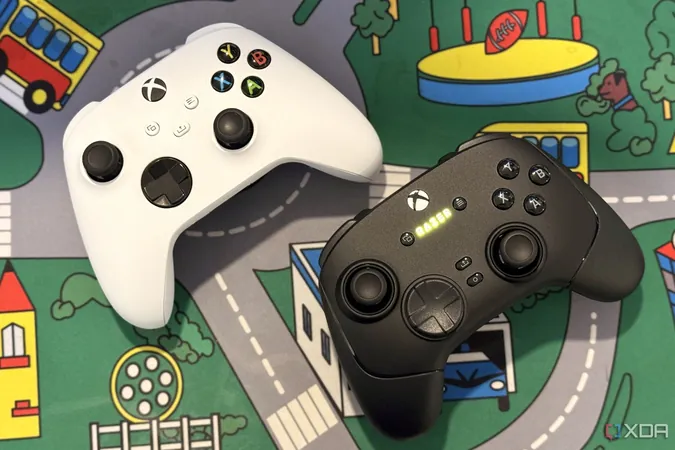
The Xbox Arcade Shutdown: A Disturbing Look into the Future of Digital Gaming
2024-10-07
Author: Daniel
The Xbox Arcade Shutdown: A Disturbing Look into the Future of Digital Gaming
The gaming world recently took a significant step towards an unsettling reality, as Microsoft announced the closure of the Xbox 360 store and marketplace—an event many might have overlooked amid the noise of new console releases and game announcements. This closure not only seals off access to beloved digital titles but also serves as a stark reminder of the precarious nature of digital ownership in an increasingly online world.
As of today, the Xbox 360’s digital storefront is nothing but a fading memory, which means that any downloadable content (DLC), arcade games, and other purchased items will become inaccessible once the store officially shuts down. This monumental shift signals the potential loss of countless games that players invested hard-earned money in, leaving them in a dire situation with no legal recourse to obtain their favorite titles post-shutdown.
The Dark Ages of Gaming: A Preview of an Uncertain Digital Future
With the Xbox Arcade being one of the first arenas for downloadable games—preceding the PlayStation 3’s offerings by a mere few months—the sense of urgency surrounding digital preservation is palpable. By the end of its lifecycle in 2016, over 700 Xbox Arcade titles emerged, each showcasing a range of creativity, from quirky indie gems to classic PC conversions. Yet, the sad truth is that once these games are no longer stored on hard drives, they may vanish altogether.
The importance of physical copies in preserving gaming history cannot be overstated. Historically, games that had limited physical availability often gained collector's value, which naturally fostered a community dedicated to their preservation. However, the shift toward cloud-based gaming means that this dynamic is rapidly fading, leaving players with virtually no alternative for accessing older titles.
A Warning of What’s to Come
With the Xbox Arcade's closure acting as a harbinger, the gaming community faces concerning times ahead. The rarity of physical media coupled with modern titles' dependence on 'always-online' features makes it increasingly difficult to access games once they’re no longer supported. The problem is compounded by stringent Digital Rights Management (DRM) policies that make it hard for developers to allow users to preserve their purchased games.
This isn’t just an isolated incident. Earlier this year, Ubisoft faced backlash for removing copies of "The Crew" from players' accounts after a server shutdown, raising questions of ownership and fairness. How can consumers truly own a game if it can be taken away at any moment, stripped of their legal rights without compensation?
While California has initiated steps to address digital ownership rights with proposed legislation, much of the regulation still doesn’t protect gamers against service shutdowns and the vanishing of digital media. In light of these challenges, the perception of buying games as a form of ownership is now a complicated mix of leasing and actual purchase, leaving many players feeling uneasy about their digital investments.
Not Just an Xbox Problem: The Threat Extends to PC Gaming
The woes of digital ownership aren’t limited to consoles; PC players are also vulnerable. Despite Steam's dominant position in the market, it doesn’t guarantee players access to their purchased titles indefinitely. Should a developer decide to pull support or a game to sunset, users could be left empty-handed. The perception of a more lenient DRM system on PCs doesn’t alleviate these concerns either, as the same principles of ownership issues apply.
As we brace for a future where digital content may not exist physically, the feasibility of preserving and playing older games is increasingly daunting. The sheer volume of effort required to keep titles playable is growing, and inevitably, many games are at risk of fading into obscurity—lost to time, disinterest, or the grave consequences of a server shutdown.
Final Thoughts: Is Digital Gaming a Dying Art?
The closure of the Xbox Arcade serves as a sobering reminder that without proactive measures for content preservation, a significant portion of our gaming heritage may be jeopardized. While it’s hard to predict how long the existing digital platforms will endure, one thing is clear: gamers need to advocate for better rights and preservation practices. Otherwise, we might soon find ourselves in the unimaginable position of owning nothing and being happy about it—which challenges the very essence of what it means to be a gamer. Are we prepared to watch our digital memories disappear? The clock is ticking.





 Brasil (PT)
Brasil (PT)
 Canada (EN)
Canada (EN)
 Chile (ES)
Chile (ES)
 España (ES)
España (ES)
 France (FR)
France (FR)
 Hong Kong (EN)
Hong Kong (EN)
 Italia (IT)
Italia (IT)
 日本 (JA)
日本 (JA)
 Magyarország (HU)
Magyarország (HU)
 Norge (NO)
Norge (NO)
 Polska (PL)
Polska (PL)
 Schweiz (DE)
Schweiz (DE)
 Singapore (EN)
Singapore (EN)
 Sverige (SV)
Sverige (SV)
 Suomi (FI)
Suomi (FI)
 Türkiye (TR)
Türkiye (TR)